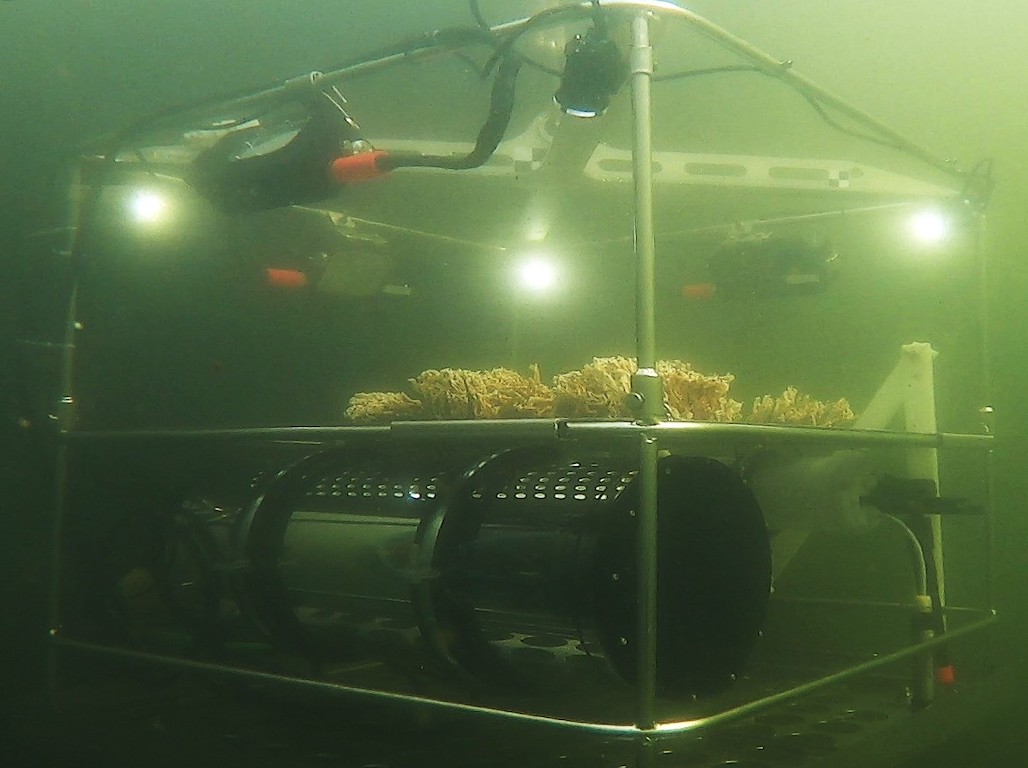29 November 2023 | The “Smart Ocean Technologies” (SOT) research group at the Fraunhofer Institute for Ceramic Technologies and Systems IKTS has successfully put its mobile underwater laboratory “Minilab” into operation. It is designed for fast and flexible testing of new materials and sensors for underwater applications. “Minilab” is now available to interested partners from industry and research for a wide range of test scenarios in lakes, rivers and oceans.
The Minilab mobile underwater laboratory enables tests to be carried out under real maritime conditions, including salt water and strong currents. For example, it can be used to analyse how well a new alloy withstands aggressive salt water. The minilab can also help to speed up the development of sustainable anti-fouling coatings, more environmentally friendly offshore structures or underwater sensor technology.
“We bring the samples and devices to be tested into the water,” explains Dr Kathrin Baumgarten, head of the SOT research group. “This helps our partners to bring their innovations to market more quickly”.
Temperature, pH value or UV rays
The test laboratory has an edge length of 70 centimetres and can dive to a depth of up to 100 metres. It offers precise measurement of various parameters under water, including temperature, pressure and UV radiation.
Designed as an open tubular steel construction, its basic equipment includes four cameras as well as temperature and pressure sensors. In addition there are sensors for measuring dissolved oxygen, chlorophyll, UV radiation, pH value and water turbidity. The test platform can be flexibly equipped with samples and other sensors and measuring devices.
So far, the laboratory has been supplied with power via a shore connection. However, a self-sufficient solution is already being planned. According to the press release, the next “Minilab” generation will be powered by batteries in a buoy, and the recorded sensor data will be transmitted directly to a mobile router in the buoy.
German-Canadian cooperation
Canadian colleagues from the Centre for Ocean Ventures and Entrepreneurship (COVE) operate their own underwater laboratory in the Atlantic Ocean in the province of Nova Scotia. There, they mainly offer underwater tests over a longer period of time.
The two services therefore complement each other: The COVE solution on Canada’s east coast is better suited to long-term tests and experiments under Atlantic conditions, while the easily transportable German “Minilab” aims to quickly gain knowledge in very different waters.
About “Smart Ocean Technologies”
The Fraunhofer Smart Ocean Technologies research group is based in Rostock. It consists of experts from four Fraunhofer Institutes: the Fraunhofer Institute for Graphic Data Processing IGD, the Fraunhofer Institute for Large Structures in Production Engineering IGP, the Fraunhofer Institute for Ceramic Technologies and Systems IKTS and the Fraunhofer Institute for Optronics, System Technologies and Image Exploitation IOSB. The Minilab is one of several projects of the group and was funded by the German Federal Ministry of Education and Research and the state of Mecklenburg-Western Pomerania.
